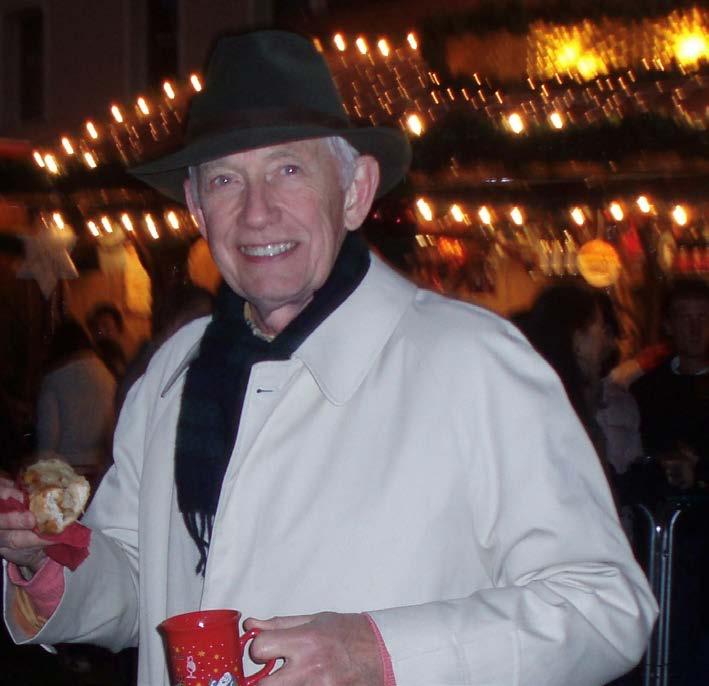Remembering Frank W. Jackson, MD Former PSG president career in Gastroenterology while also maintaining a small Internal Medicine primary care practice, patient relationships of which became lifelong. He founded his own Gastroenterology practice in 1974 and maintained a private GI practice, Jackson Gastroenterology, until he retired from the practice of Medicine in 2003. His son, F. Wilson Jackson, MD, joined the practice in 1999.
Dr. Frank Jackson
FF rank W. Jackson, MD passed away
September 29, 2021, at the age of 88. Born June 23, 1933 in Pittsburgh, PA he was the middle of three boys in the family. After graduating from Peabody High School in Pittsburgh, he attended Princeton University with a major in Biology, and then completed medical school was completed at Johns Hopkins (class of 1959). While a medical student, he and his recently wedded wife Joaquine spent a summer providing medical care, traveling by car, boat, bike, mule, or foot to the townspeople of the remote town of Twillingate in the northern reaches of Newfoundland. He completed a one-year internship at the old Bellevue Hospital in New York City where he contracted and recovered from tuberculosis, before returning to Pennsylvania where he completed training in Internal Medicine and then Gastroenterology at the University of Pennsylvania. In 1965, Dr. Jackson and his wife moved to Harrisburg, PA to join the Cowley Medical Group, a prominent, multi-specialty medical practice in the community. He established his
Dr. Jackson’s career paralleled the growth and impact of the endoscope and pharmaceutical innovation on Gastroenterology. He was endlessly fascinated to bring endoscopic findings into the clinical arena of office-based patient care. A restless intellect, he made numerous contributions to medicine. He was a founding medical director of a cardiac rehab program in the mid and late 1970’s, a first of a kind in the nation and well before cardiac rehab became a mainstay of patient management. Around the same time and before the use of computer-interpreted EKGs, he designed a handheld device to facilitate interpretation of EKGs with measurements of PR and QT intervals. He sold the device to a pharmaceutical company and promptly took his wife and five kids on a memorable ski trip to Switzerland. He later pioneered and patented a compact, benchtop device that enabled rapid, efficient, and consistent quality H&E stains (Neat Stain). Recognizing the potential of computer assisted learning, he founded in the 1980’s an outpatient rehab program (American Rehab Center) that focused on patient-centric, educational programs around diabetes, congestive heart failure, hypertension and obesity. Around
3
the same time, he established Chek-Med Systems, a company that focused on educational material for patient medications. Passionate about patient education, he broadened the company’s portfolio on a wide range of diets and GI diseases, creating a subsidiary company, Meducate. With the advent of the internet, this patient educational material became the foundation of one of the most widely read patient resource for GI diseases, medications, and diets. Ever a champion for patients and health care efficiency, Dr. Jackson was an early advocate to move routine endoscopy out of the hospital and into ambulatory surgical centers. He founded the first freestanding ASC in the Commonwealth of Pennsylvania in 1995. Many of the rules and regulations of ASCs had not yet been established and worked hard to help the Pennsylvania Department of Health to create these standards. He was an early champion of propofol sedation in endoscopy dating back to the mid 1990’s. Somewhat unapologetically, he found hospital-based patient care inefficient and unnecessarily costly, not only for routine endoscopy but also ambulatory and acute patient care. He created one of the first dedicated, office-based GI infusion centers shortly after the FDA approval of infliximab. He spent the later part of his career managing and exploring how a wide range of acute GI patient disorders could be managed within the office and structured his practice to enable ambulatory care for many acute GI symptoms, effectively creating a GI specific, urgent-care clinic within his office for his patients to use. continued on page 4





